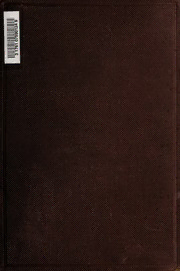Table Of ContentINDUSTRY IHTELLLIGEN OE
Toronto Public Library.
'RESENTED (By
WS/S/XWKV. N/;v\/\V>vWA 'V •
J
<7 Kj
\
/
Digitized by the Internet Archive
in 2018 with funding from
University of Toronto
https://archive.org/details/dictionaryofengl01wedg
a
A
DICTIONARY
OF
ENGLISH ETYMOLOGY.
HENSLEIGH WEDGWOOD, M. A.
LATE FELLOW OF CHR. COLL. CAM.
VOLUME I. (A-D.)
WITH NOTES AND ADDITIONS,
BY
GEORGE P. MARSH.
NEW YORK:
SHELDON AND COMPANY, PUBLISHERS.
BOSTON: GOULD AND LINCOLN.
1862.
/
Entered according to Act of Congress, in the year 1862, by
Sheldon and Company,
in the Clerk’s Office of the District Court for the Southern District of New York.
RIVERSIDE, CAMBRIDGE:
STEREOTYPED AND PRINTED BY II. 0. HOUGHTON.
PREFACE
TO TIIE
AMERICAN EDITION OF THE FIRST VOLUME.
The views and aims of the learned author of the Dictionary of English Ety¬
mology are fully set forth in the Introduction, and it is here necessary only
to say that the principal object of the work is to illustrate and enforce the
theory that language is imitative in its origin and primary character. For
this purpose, a large number of English words are compared with interjec-
tional articulations evidently imitative of natural sounds, and are traced
directly, or by the analogy of corresponding words in other tongues, to these
interjections as their original source. The general proposition has been more
ably sustained by Mr. Wedgwood than by any earlier English or perhaps for¬
eign philologist, and few previous writers have suggested so many etymologies
which are both probable, and new to the English lexicography of the first
four letters of the alphabet.
But the author has not confined himself wholly to probable and presump¬
tive derivations, and he has introduced many carefully traced historical ety¬
mologies, which, though not the most conspicuous, are by no means the least
valuable feature of the work.
In the present edition, the original text is printed entire, with no change
but the correction of perhaps half a dozen errors of the press and the trans¬
fer of the articles composing the Appendix to their proper places in the
alphabet. My additions consist of notes upon a considerable number of words,
a list of which is given at the end of this preface. These notes are inclosed
in brackets and signed with the initial M. My observations, as will be seen,
are confined almost wholly to historical derivation, and I have attempted little
in the way of conjectural deduction from imitative sounds, from the supposed
natural significance of primary consonantal combinations, or from the analogies
of ancient and remote languages not actually known to have contributed
directly to the composition of the English vocabulary. This course has been
imposed upon me as well by necessity as by choice. I will not indeed affect
to say, with Capgrave, that “I want ny al that schuld longe to a studier,”
iv PREFACE.
but I possess few works on linguistics or comparative philology, and I have
consequently been obliged to rely on the slender resources of a private library,
collected with no reference to etymological investigation, but only for the pur¬
poses of general culture. But though the want of special facilities has much
increased my labor, I by no means suppose that this want has proved a dis¬
advantage to my work. It has driven me to original research, instead of a
rethrashing of other men’s already well-beaten sheaves, and the illustrations
adduced, which are, with not many exceptions, of my own collecting, are, I
think, more important as contributions to the certain or probable history of
English words, than anything I could have gleaned from the excerpts and
references which have been already employed by English and Continental
lexicographers. In searching for authorities, I have generally selected books
which have been little or not at all resorted to by students of English ety¬
mology, because I thought the chances of meeting with hitherto unnoticed
forms and combinations of the words under discussion would thus be increased,
and American scholars will find, in the rarity of many of these books in this
country, a sufficient apology for a fulness of quotation which might otherwise
seem superfluous, not to say ostentatious.
Access to a more complete etymological apparatus might have tempted me
to spare myself the toil of many weeks of miscellaneous and sometimes
crabbed reading for the chance of lighting upon new exemplifications of im¬
portant forms or uses of words, but it is my conviction that in the present
state of philological knowledge in this country, historical investigation of
words, original materials for which can be collected in no other way, is a
method of inquiry more likely to be acceptable and useful to the public for
whom this edition is designed than any conjectural speculation, however in¬
geniously conducted.
Another consideration has influenced my selection of authors to be read in
search of illustrations. It is the desire to do something towards turning the
attention of American linguistic students to the origin and development of the
modern European languages, as exhibited, not in recent, but in mediaeval, liter¬
ature, for I am persuaded that there is yet an abundant harvest to be reaped
in that field, as respects not only etymology, but also the history and the
theory of the origin and true significance of inflectional forms in all human
language.
The proportion of the words discussed by Mr. Wedgwood which I have
annotated is not large, because his conclusions as to the majority of them
appear to me satisfactory, and in many cases where his views do not com¬
mand my assent I am not prepared with evidence to sustain me in disputing
them. I certainly do not believe that “ the Icelandic barlci, the throat,” derived
“from an imitation of the sound” of harking, is “probably the origin of” barge

